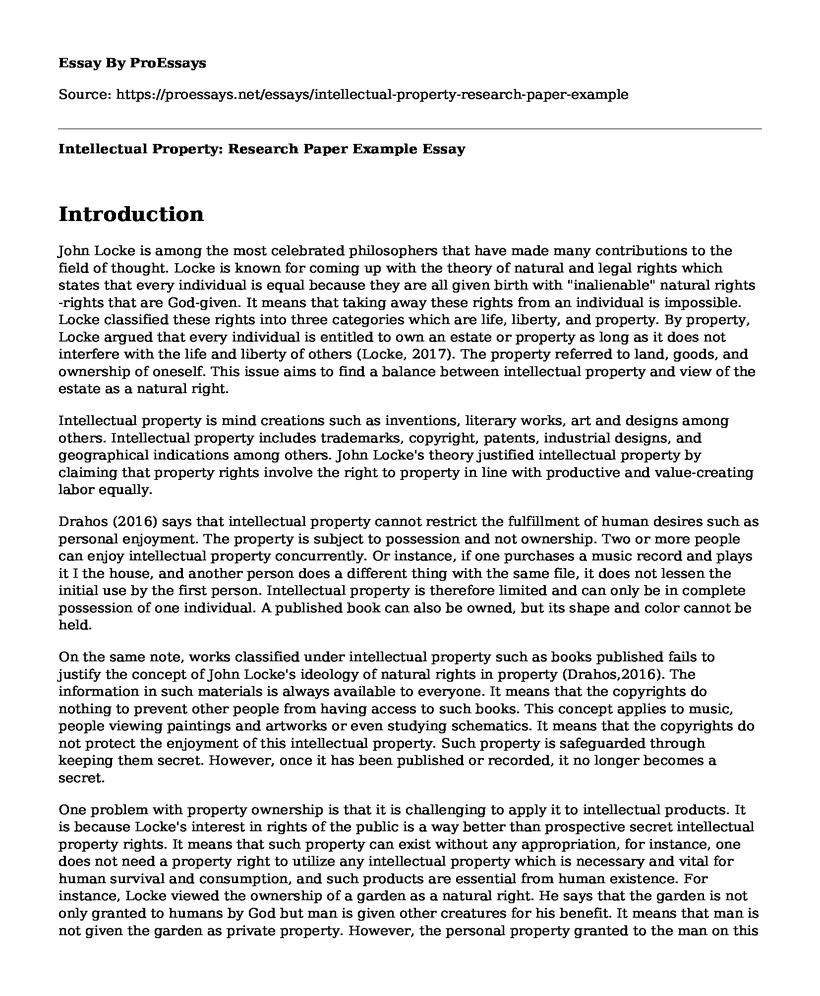Introduction
John Locke is among the most celebrated philosophers that have made many contributions to the field of thought. Locke is known for coming up with the theory of natural and legal rights which states that every individual is equal because they are all given birth with "inalienable" natural rights -rights that are God-given. It means that taking away these rights from an individual is impossible. Locke classified these rights into three categories which are life, liberty, and property. By property, Locke argued that every individual is entitled to own an estate or property as long as it does not interfere with the life and liberty of others (Locke, 2017). The property referred to land, goods, and ownership of oneself. This issue aims to find a balance between intellectual property and view of the estate as a natural right.
Intellectual property is mind creations such as inventions, literary works, art and designs among others. Intellectual property includes trademarks, copyright, patents, industrial designs, and geographical indications among others. John Locke's theory justified intellectual property by claiming that property rights involve the right to property in line with productive and value-creating labor equally.
Drahos (2016) says that intellectual property cannot restrict the fulfillment of human desires such as personal enjoyment. The property is subject to possession and not ownership. Two or more people can enjoy intellectual property concurrently. Or instance, if one purchases a music record and plays it I the house, and another person does a different thing with the same file, it does not lessen the initial use by the first person. Intellectual property is therefore limited and can only be in complete possession of one individual. A published book can also be owned, but its shape and color cannot be held.
On the same note, works classified under intellectual property such as books published fails to justify the concept of John Locke's ideology of natural rights in property (Drahos,2016). The information in such materials is always available to everyone. It means that the copyrights do nothing to prevent other people from having access to such books. This concept applies to music, people viewing paintings and artworks or even studying schematics. It means that the copyrights do not protect the enjoyment of this intellectual property. Such property is safeguarded through keeping them secret. However, once it has been published or recorded, it no longer becomes a secret.
One problem with property ownership is that it is challenging to apply it to intellectual products. It is because Locke's interest in rights of the public is a way better than prospective secret intellectual property rights. It means that such property can exist without any appropriation, for instance, one does not need a property right to utilize any intellectual property which is necessary and vital for human survival and consumption, and such products are essential from human existence. For instance, Locke viewed the ownership of a garden as a natural right. He says that the garden is not only granted to humans by God but man is given other creatures for his benefit. It means that man is not given the garden as private property. However, the personal property granted to the man on this garden is his "own self." In relation to intellectual property, it means that in as much as we might not own certain aspects of intellectual property, the segment that we enjoy the part we possess.
Conclusion
In conclusion, Intellectual property brings out the idea that there is a big difference between ownership and possession. It means that a person can possess a garden, but do not own it. The reverse is true where an individual enjoys the rights of owning a property, but the property might not be in his or her possession. It, therefore, means that Locke's ideology of intellectual property can grant the opportunity for fair use, as long as the society agrees that its purpose is good for the community. It means that it is up to the society to make such a decision.
References
Drahos, P. (2016). A philosophy of intellectual property. Routledge.Locke, J. (2017). Of property. In Theoretical and Empirical Studies of Rights (pp. 13-27). Routledge.
Cite this page
Intellectual Property: Research Paper Example. (2022, Feb 12). Retrieved from https://proessays.net/essays/intellectual-property-research-paper-example
If you are the original author of this essay and no longer wish to have it published on the ProEssays website, please click below to request its removal:
- Domestic Violence Courts Essay Example
- Essay Example on For-Profit Prisons: Making Profits Through Lobbying Activities
- Cybercrime: Unlawful Access & Data Loss Risk From Cookies - Research Paper
- Paper Example on The Black Power Mixtape: A Movement's Journey 1967-1975
- Essay Sample on secure Computer Forensics: Investigator & Crime Lab QA/QC
- Free Essay on Governing a State: Ethical Dilemmas and Legal Challenges
- Emerging Technologies and Ethical Concerns - Essay Example







